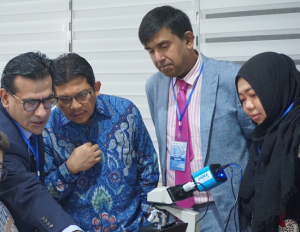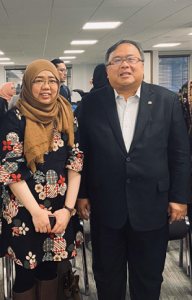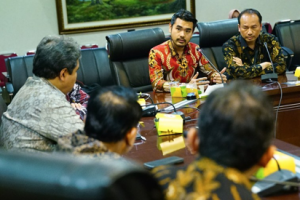
May 15, 2020, by Katie Andrews
Nottingham researchers support Indonesian government to ramp-up COVID-19 testing and research
Researchers from the University of Nottingham have been working closely with Indonesia authorities to support the management of COVID-19 in the country.
Members of the Nottingham-Indonesia Collaboration for Clinical Research and Training (NICCRAT) consortium, supported by the Embassy of the Republic of Indonesia, are advising government on areas such as COVID testing and research.
The consortium is tasked to offer insight and formulate the national research, innovation and capacity building streams with the immediate impact to support COVID-19 management.
The expertise of consortium lies mainly in the area of genetics and molecular diagnostics and the NICCRAT teams are focusing their effort to increase the capability of PCR (Polymerase Chain Reaction)-based diagnostic testing in the country. The groups are also advising Jakarta’s local government on how to optimise resources to deliver the PCR tests at maximum capacity.

Professor Ali Gufron Mukti, the Director General of Higher Education of the Indonesian Ministry of Research, Technology and Higher Education; Professor Ilyas, Dr. Abhik Mukherjee and Ms Susanti from Nottingham.
The NICCRAT initiative was launched at the beginning of 2019 by Professor Mohammad Ilyas and his former PhD student, Susanti Susanti to foster training and research collaborations with Indonesian academic and research institutions. The group has been highly successful and received a seed funding from Islamic Development Bank to establish a spin-off company, PathGen Diagnostik Teknologi, to implement low cost molecular diagnostic platform in Indonesia.
Susanti, who is now starting her post as a research fellow in Professor Mohammad Ilyas’ group, was invited by the Indonesian Ministry of Research and Technology to join the National Consortium of COVID-19 Research and Innovation. Due to Susanti’s participation in many development projects across Indonesia prior to COVID, she was recruited to join a host of other experts as an instructor in a weekly online training programme which provides guidance for more than 1,000 health care professionals who are working on COVID-19 diagnostic testing across Indonesia.

Ms. Susanti with Prof. Bambang Brodjonegoro, PhD., Indonesian Minister of Research and Technology during his visit to the UK on February 2020
Through NICCRAT spin off company, PathGen Diagnostik Teknologi, two research assistants have been employed to assist partners in Indonesia Institute of Sciences to do the research and innovation activities as well as to perform the diagnostic testing of COVID-19.
She has also been engaged in the conception and the delivery of two main studies, in collaboration with a team in the Indonesia Institute of Sciences, led by Dr. Wien Kusharyoto, to develop a more robust point-of-care diagnostic test to detect SARS-CoV-2 virus and to utilise portable sequencing technology – Oxford Nanopore Technology (ONT) – to perform whole genome sequencing of the virus found in Indonesia.
NICCRAT is being supported on the ONT project by Matthew Loose, Professor of Developmental and Computational Biology in the Faculty of Medicine and Health Sciences, and post-doctoral research fellow Dr Inswasti Cahyani.
In another strand of activity, Dr Bagus Muljadi, director of the Indonesia Doctoral Training Partnership (IDTP) at the University of Nottingham, has been actively advising the Indonesian government to utilise its diaspora asset to help the nation utilise its human resources to boost quality research and innovation. Before the COVID-19 outbreak, he had been urging the country to prioritise research in disaster management as one of the key issues Indonesia has to deliver.
During the COVID-19 outbreak, Dr Muljadi, part of the Indonesian International Scholars Association (I-4) management board, has been collaborating with the Indonesian Ministry of Research and Technology in designing the recently launched Indonesian Diaspora Research Funding Scheme to battle COVID-19.

Dr Bagus Muljadi briefing the Chief of Presidential Staff – General Moeldoko. After the briefing, Dr Muljadi contributed to a white paper for President Joko Widodo, identifying the key research areas the government needs to invest its resources in.
In February 2020, at the beginning of the outbreak of COVID-19 in Indonesia, with support from the University’s Asia Business Centre, the IDTP has been advising the Ministry of Research and Technology on how to best use its resources in strengthening the country’s resilience against disruption and disasters. As a result, on March 26th 2020, the Research and Technology Ministry and the National Research and Innovation Agency (BRIN) formed a consortium to develop protection gear, rapid test kits, medicine and vaccines. IDTP’s officer Dr Susanti Susanti is part of the consortium, providing online training regarding using PCR for Indonesian health workers.
Since 2017, Dr Muljadi has been actively involved in advising the Indonesian government in creating and implementing new policies in research and technology in order to boost the country’s quality research productivity. As a part of a select group of diaspora academics, he is invited every year to provide input to the country’s highest offices including the Chief of Presidential Staff, General Moeldoko, and the former Vice-President of the Republic of Indonesia, Professor Jusuf Kalla, in the State Palace.
No comments yet, fill out a comment to be the first

Leave a Reply